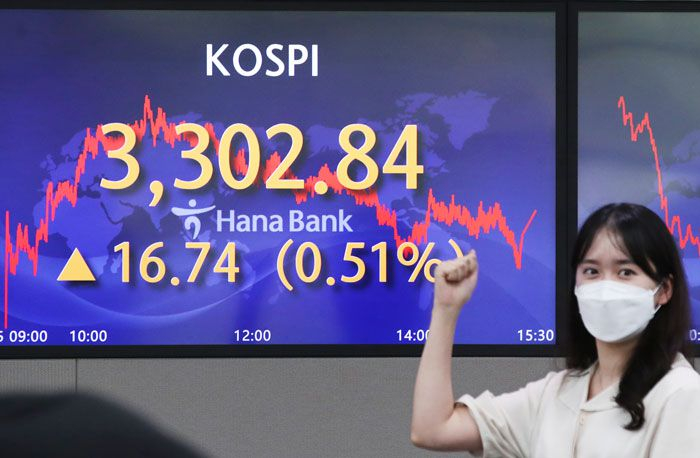Markets
Korea’s household investment in stock assets up by 62.8% vs. Q1 2020
The stock assets held by Korea’s households and non-profits surpassed 1,000 trillion won for the first time in history
By Jul 08, 2021 (Gmt+09:00)
3
Min read
Most Read
LG Chem to sell water filter business to Glenwood PE for $692 million


Kyobo Life poised to buy Japan’s SBI Group-owned savings bank


KT&G eyes overseas M&A after rejecting activist fund's offer


StockX in merger talks with Naver’s online reseller Kream


Mirae Asset to be named Korea Post’s core real estate fund operator



South Korean households over the last 12 months have vastly increased investments in both domestic and overseas stock markets, with the total invested amount surpassing 1,000 trillion won ($872 billion) for the first time in history, according to the Bank of Korea (BOK).
BOK data released on July 8 showed that the total amount of stock assets, which include securities and funds, held by the country’s households and non-profits as of the end of the first quarter was up by 62.8% versus the same period in 2020.
The households and non-profit organizations held 1,053 trillion won ($918 billion) worth of stocks at the end of March this year, compared to 647 trillion won ($564 billion) by the end of March 2020.
Analysts say that such record-breaking growth in stock market investments over the last year is largely driven by the continued growth of cash and bank deposits held by households and non-profit organizations.
According to BOK data, the amount of cash and bank deposits they held at the end of March surpassed 2,000 trillion won ($1.74 trillion) for the first time, at 2,010 trillion won ($1.75 trillion). The figure marks an 8.7% growth from that of the same period last year.
The increase in cash and bank deposits was driven by both loans and income, said the analysts. The total amount of household loans by the end of March was 2,051 trillion won ($1.79 trillion), up 11.3% from March 2020. During the same time period, Korea’s average disposable income per household also increased by 0.8% to 3.51 million won ($3,060).
The average disposable income has grown over five consecutive quarters from last year’s first quarter. The growth rate was 3.7% in the first quarter of 2020 versus the same period in 2019, 5.5% in the second quarter, 4.0% in the third quarter and 2.3% in the fourth quarter.
The analysts noted that the rise in household income in Korea was largely driven by the massive amount of COVID-19 relief funds as well as the increased government subsidies on employment.
HOUSEHOLD STOCK INVESTMENTS IN DETAIL
Of the 1,053 trillion won ($917 billion) worth of stock assets held by the households and non-profit agencies, 887 trillion won ($773 billion) were invested in domestic securities, 57 trillion won ($50 billion) in overseas securities and 109 trillion won ($95 billion) were funds.
The portion of securities out of all financial assets held by the households and non-profits by the end of March was 20.3%, up 6.6 percentage points versus the same period in 2020 at 13.7%. The portion held by bank deposits was down by 3.2% over the same period to 41.0%.
According to data, the households over the last five quarters have continued to invest more in the stock market in large sums. In the first quarter of 2020, they made a net purchase of 4.3 trillion won ($3.7 billion) in securities and funds, in both domestic and overseas markets. The figure grew drastically to 25.4 trillion won ($22.1 billion) in the second quarter and 30.9 trillion won ($26.9 billion) in the third quarter last year.
The number went down sharply to 15.6 trillion won ($13.6 billion) in the fourth quarter, after which it recorded a new historical high at 51.5 trillion won ($44.9 billion) in the first quarter of 2021.
Market analysts said that the households in South Korea are likely to continue to make positive net purchases of stocks and funds, with strong bull markets in Korea and the US.
Write to Ik-hwan Kim at lovepen@hankyung.com
Daniel Cho edited this article.
More to Read
-
 Household debtHeavy household borrowing fans Korea’s asset market overheating
Household debtHeavy household borrowing fans Korea’s asset market overheatingMay 13, 2021 (Gmt+09:00)
3 Min read -
 Household debtsS.Korean banks' household, company loans near $1.8 trn
Household debtsS.Korean banks' household, company loans near $1.8 trnJan 15, 2021 (Gmt+09:00)
2 Min read -
 Household debtS.Korea's household debt ratio exceeds 100% for first time
Household debtS.Korea's household debt ratio exceeds 100% for first timeNov 24, 2020 (Gmt+09:00)
1 Min read -
 Korean household credit risk nears record-high
Korean household credit risk nears record-highJul 16, 2020 (Gmt+09:00)
3 Min read -
 Record-high Q2 Korean household debt heats up property, stock markets
Record-high Q2 Korean household debt heats up property, stock marketsAug 21, 2020 (Gmt+09:00)
2 Min read
Comment 0
LOG IN


